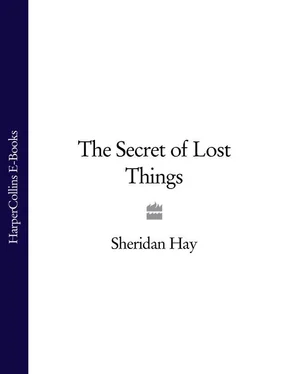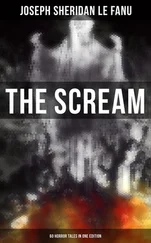The Secret of Lost Things
Sheridan Hay
FOR
MICHAEL,
my own tempest
“…for experience, the only true knowledge…”
Herman Melville, The Confidence Man
Cover Page
Title Page The Secret of Lost Things Sheridan Hay
Dedication FOR MICHAEL, my own tempest
Epigraph “…for experience, the only true knowledge…” Herman Melville, The Confidence Man
PART ONE PART ONE
CHAPTER ONE
CHAPTER TWO
CHAPTER THREE
CHAPTER FOUR
CHAPTER FIVE
CHAPTER SIX
PART TWO
CHAPTER SEVEN
CHAPTER EIGHT
CHAPTER NINE
CHAPTER TEN
CHAPTER ELEVEN
CHAPTER TWELVE
PART THREE
CHAPTER THIRTEEN
CHAPTER FOURTEEN
CHAPTER FIFTEEN
CHAPTER SIXTEEN
CHAPTER SEVENTEEN
CHAPTER EIGHTEEN
CHAPTER NINETEEN
PART FOUR
CHAPTER TWENTY
CHAPTER TWENTY-ONE
CHAPTER TWENTY-TWO
CHAPTER TWENTY-THREE
CHAPTER TWENTY-FOUR
CHAPTER TWENTY-FIVE
AUTHOR’S NOTE
About the Author
Praise
Copyright
About the Publisher
PART ONE
I was born before this story starts, before I dreamed of such a place as the Arcade, before I imagined men like Walter Geist existed outside of fables, outside of fairy tales. My time at the Arcade would have gone very differently but for him, for his blindness. His eyes were very nearly useless when I met him, and were it not for his condition, I would never have known about Herman Melville’s lost book. Walter Geist’s blindness is important, but it’s my own, with regard to him, that remains a lasting regret. It’s the reason for this story. If I start with my own beginning you will understand how I came to the Arcade, and how it came to mean so much to me.
I was born on April twenty-fifth, never mind what year precisely; I’m not so young that I care to put my age about, but not so old now that I forget the girl I was.
My birth date, however, is significant in another sense. April twenty-fifth is Anzac Day, the most important day of commemoration on the Australian calendar. It is the day when Australians pin sprigs of rosemary to their breasts to remember those lost to war, to remember that first great loss, at Gallipoli, where rosemary grows wild on the beaches. “There’s rosemary, that’s for remembrance,” says Ophelia, once she’s lost her mind to grief. “Pray you, love, remember.”
It was April twenty-fifth on the island state of Tasmania, when my mother saw stalks of spiky rosemary pinned over hearts, the day she walked to the free public hospital to give birth to me, walked through the crowded Square trying to avoid the ragged annual parade of veterans and gawking locals. That hardy plant stayed in her mind through a difficult labor, not as the symbol of loss, for she was gaining me, but as an emblem of memory.
Anzac Day, then, determined my name—Rosemary. And given along with my name, the occupation I practice here—to remember. After all, memory is a kind of obligation, perhaps the last duty owed anyone.
I have only one other name. My last—Savage. And Mother too gave me this name, only Mother. She brought me home to the small flat she rented above the shop off the central town Square. Remarkable Hats was the only store of its kind on the island of Tasmania, and we grew up in that shop, Mother and me. But like a pair of goldfish, we grew only so much as the bowl allowed. We came to fit it, but we lived in a bowl of separateness, a transparent wall between us and the rest of the town. Mother had come from the mainland, she was an outsider, and everyone knew that “Mrs.” Savage was a prefix that didn’t disguise one single defining fact: there wasn’t a husband in sight.
But disguise, in a way, was Mother’s business. Hats, after all, can cover up a good deal of what one might not want revealed. Hats can even grant a measure of acceptance to a woman who’d appeared from the mainland to establish a small, decent business—pregnant, without an apparent partner.
“It’s hats that saved us,” Mother often said. “That’s why I call these hats remarkable. They made me unavoidable to respectable people.”
It was imagination that saved us. Hers, in particular. And I like to think imagination was her gift to me.
Remarkable Hats made Mother something of an arbiter of taste in our town as well as wise to vanity. She could guess the hat size of customers within moments of laying eyes on them. The measurements of regular customers she memorized, along with a characteristic that, to her, matched the circumference of their head.
If she saw our prosperous and ambitious landlord, Mr. Frank, in the Square she’d say: “That Mr. Frank, no wonder he’s a nine-and-three-quarters. With all those big ideas, he certainly needs the space.”
Or she’d mention that Mrs. Pym, the florist, had been trying on hats to wear to the Cup: “Of course, Rosemary, nothing I had was right. Pym is one of those five-and-a-halfs. Practically a pinhead. No room in there for a thought, let alone a decision.”
Hats were oracles, divining rods to behavior, and while Mother’s way of judging her fellow Tasmanians was often accurate, matching the opprobrium of a small town with her own brand of snobbishness did little to relieve our isolation. Of course, isolation itself worked on our imaginations, our illusions, separating us even more. We were only glancingly acknowledged, and never included. I helped in the store after school. Friends were discouraged, if they’d ever been interested, or more precisely, curious.
We had each other.
“Better to do well in school,” Mother advised. “Keep up your reading.” And she’d tap her temple with her index finger for emphasis. “All your future’s there beneath your hat.”
She didn’t mention my body. She never did, except in the most perfunctory way, imparting only biological information. As Mother knew firsthand, bodies caused trouble.
She did have one close friend, Esther Chapman, a mentor to me and the owner of Chapman’s, the only shop in the village that sold books. Miss Chapman (I called her Chaps from early on) helped to educate me, taking me to any theater that made its way to our small town, favoring the rare Shakespeare troupe that occasionally washed ashore in Tasmania. Chaps taught me to read before I started school, endowing my purposes with words she would have said, quoting from her favorite play. Chaps held that books were essential, whereas hats were a kind of ephemera, a fancy, objects that ultimately wouldn’t provide Mother or me with security.
She worried for us.
“Books aren’t lumps of paper, but minds on shelves,” she urged Mother. “After all, hats aren’t books—people don’t need them.”
“Tell that to a bald man in the summer,” Mother teased back. “Or to a plain-faced woman.”
But Chaps was right to be concerned.
By the time I finished school, Remarkable Hats was mostly remarkable in that it was still in business. Hats were no longer fashionable, no longer the article of differentiation between decent people and ill-bred ones. Hats went the way of gloves and stockings. Eventually, even regular customers were infrequent, not immune to the whims of fashion or mortality. The town itself was waning.
Mother’s own health had been in steady decline for some time, linked as it was to the dwindling business. She was a small woman, and dark, and she grew thin and pale with worry. As I grew older, Mother diminished. In the absence of customers, Mother had me try on hats after school. I had the height, she liked to tell me. It cheered her up.
Читать дальше












